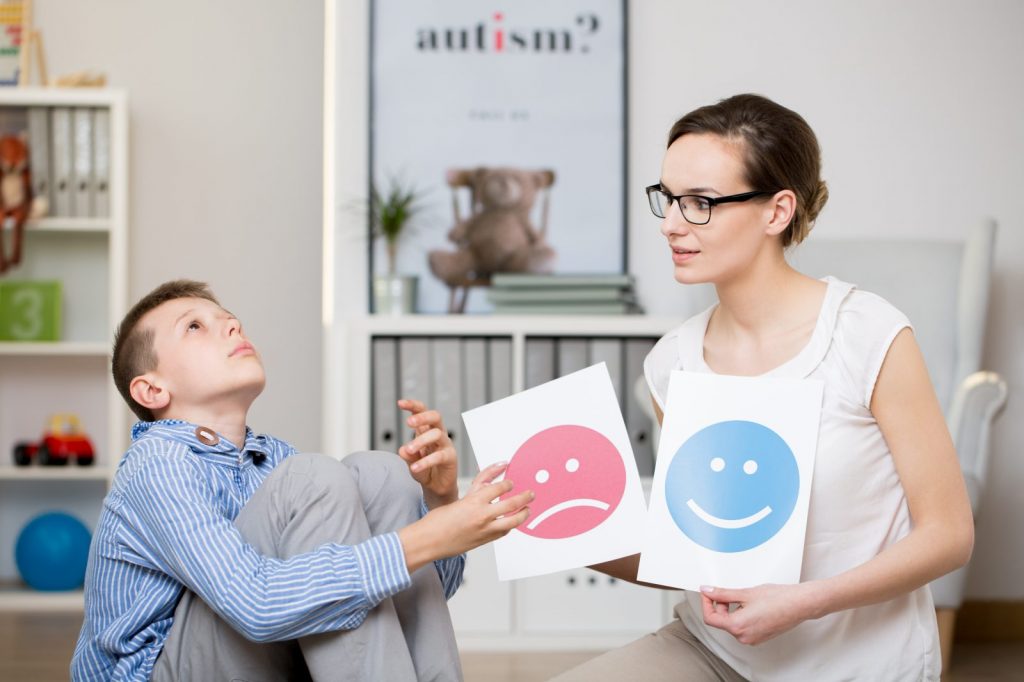 Understanding that each child with autism is unique is the essence of today’s pediatric autism treatment. Recent advances in therapies like Cognitive Behavioral Therapy (CBT), behavioral interventions, and more are making a difference in the way professionals work with children with autism. Beginning with a comprehensive multifaceted assessment, doctors and therapists who work with autistic children develop individualized plans that address the specific skills, opportunities, and challenges of each child.
Understanding that each child with autism is unique is the essence of today’s pediatric autism treatment. Recent advances in therapies like Cognitive Behavioral Therapy (CBT), behavioral interventions, and more are making a difference in the way professionals work with children with autism. Beginning with a comprehensive multifaceted assessment, doctors and therapists who work with autistic children develop individualized plans that address the specific skills, opportunities, and challenges of each child.
What is a Professional Assessment?
The significance of personalized assessments in the care of children with autism cannot be underestimated. These assessments help healthcare professionals understand your child’s strengths and challenges. The assessments can be broken down into 3 steps:
1. Initial Discussion: Share your child’s history, highlighting concerns. This step helps identify areas that need attention.
2. Tailored Treatment Recommendations: After assessment, healthcare professionals will discuss personalized treatment
recommendations to address your child’s specific needs.
3. Child-Centric Evaluation: A sensory-friendly evaluation that mimics daily life. This provides insights into your child’s abilities and areas needing support.
What Treatment Therapies Are Available?
 There are a number of effective treatment approaches professionals use when working with children with autism. A child’s plan may include a combination of these approaches as best determined by your child’s care team. They may include:
There are a number of effective treatment approaches professionals use when working with children with autism. A child’s plan may include a combination of these approaches as best determined by your child’s care team. They may include:
Cognitive Behavioral Therapy (CBT): CBT is an evidence-based approach that focuses on helping your child reframe their thought patterns, reducing anxiety and improving emotional regulation. It often involves teaching children coping skills, problem-solving abilities, and emotional resilience.
Behavioral Interventions: These are specialized strategies developed to address and modify specific behaviors, paving the way for your child’s growth.
Dialectical Behavior Therapy (DBT): Simply put, this approach helps a child manage their emotions and interpersonal skills, promoting self-awareness that helps your child navigate social environments with greater ease.
Individualized Education Plans (IEPs): IEPs are educational plans designed specifically for your child’s learning pace and style, ensuring they receive the most conducive learning experience.
Social Skills Training: These are exercises aimed to better your child’s ability to interact with their friends and peers, building the foundation for lasting relationships.
Alternative Therapies: Often art, music, and mindfulness therapies can provide your child with alternative avenues for expression and emotion management.
Pharmacological Guidance: Some targeted medication plans can address a child’s specific symptoms, while ensuring their safety and overall health.
What is the Future of Autism Care?
 Medical science is evolving, and the area of autism care is no exception. Researchers, doctors, and therapists continue to work on a number of promising innovations for children with autism like precise medications that target root causes, genetic-based treatment choices, diet-based interventions based on genetics, and technological solutions that can predict and enhance therapy.
Medical science is evolving, and the area of autism care is no exception. Researchers, doctors, and therapists continue to work on a number of promising innovations for children with autism like precise medications that target root causes, genetic-based treatment choices, diet-based interventions based on genetics, and technological solutions that can predict and enhance therapy.
The Center for Behavioral Health at Woods embraces the latest advancements in autism treatment. We believe it’s important to educate and involve parents and caregivers to ensure the best life for your child. With an experienced wellness team that includes psychiatrists, psychiatric nurse practitioners, psychologists, nurse navigators, counselors, and family therapists, we are able to offer a comprehensive list of outpatient services for individuals with autism and developmental disabilities.
We embrace the fact that no two people are exactly alike, and there is no such thing as a one-size-fits-all approach to behavioral health.
“We are so grateful they were able to see our son right away. Finally, we have some answers and know that he is getting the help he needs to calm his behaviors. His therapist is wonderful!”
– Tom S.
We’re here for you! We’re here to embrace the uniqueness of your child. Call for an appointment today!


